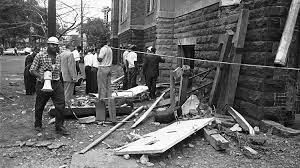In 2001, the United States commemorated the tragic events of the 16th Street Baptist Church bombing in Birmingham, Alabama, a heinous act of racial violence that occurred on September 15, 1963. The bombing of the 16th Street Baptist Church remains a dark chapter in American history, serving as a stark reminder of the deep-seated racism and hatred that have plagued the nation and the struggle for civil rights and racial equality. The 16th Street Baptist Church bombing was a pivotal moment in the civil rights movement, galvanizing support for the fight against segregation and discrimination and inspiring a new generation of activists to continue the quest for justice and equality. The 16th Street Baptist Church, located in Birmingham, Alabama, was a prominent and historically significant African American church that served as a gathering place for civil rights leaders, activists, and community members. On the morning of September 15, 1963, a bomb planted by white supremacists exploded outside the church, killing four young African American girls and injuring many others who were attending Sunday school. The victims, Addie Mae Collins, Cynthia Wesley, Carole Robertson, and Carol Denise McNair, ranged in age from 11 to 14 years old, innocent children whose lives were cut short by an act of senseless violence and hatred. The bombing of the 16th Street Baptist Church sent shockwaves across the nation and around the world, drawing attention to the brutal reality of racial violence and discrimination in the United States. The attack on the church, a sacred and peaceful place of worship, was a deliberate and cowardly attempt to instill fear, terror, and division within the African American community and undermine the progress of the civil rights movement. Instead, the bombing of the 16th Street Baptist Church served to galvanize support for the cause of civil rights and inspire a wave of activism and solidarity in the fight against racism and injustice. In the aftermath of the 16th Street Baptist Church bombing, the nation mourned the loss of the four young girls and condemned the perpetrators of this heinous act. The FBI launched an investigation into the bombing, but initial efforts to bring the perpetrators to justice were hindered by a lack of cooperation from witnesses and community members who feared reprisals from white supremacist groups. It was not until many years later that several individuals involved in the bombing were identified, arrested, and brought to trial, leading to convictions and a measure of accountability for the tragic events of that fateful day in 1963. The legacy of the 16th Street Baptist Church bombing endures as a powerful symbol of the struggle for civil rights and racial justice in America. The courage and resilience of the victims and their families, who faced unimaginable loss and grief with dignity and grace, continue to inspire and uplift those who seek to create a more just and equitable society. The 16th Street Baptist Church bombing stands as a stark reminder of the enduring legacy of racism and hatred in American society and the ongoing need to confront and address systemic injustice and inequality in all its forms. As the United States commemorated the 16th Street Baptist Church bombing in 2001, the nation reflected on the progress that had been made in the fight for civil rights and racial equality since that tragic day in 1963. The memory of the four young girls who lost their lives in the bombing served as a poignant reminder of the human cost of racism and discrimination and the urgent need to continue the work of building a more inclusive, just, and compassionate society for all. The 16th Street Baptist Church bombing remains a pivotal moment in American history, a testament to the resilience and courage of those who have fought for justice and equality, and a call to action to confront the legacy of racism and hatred that continues to shape the nation's path forward.
2001 U.S.A. 16th Street Baptist Church Bombing
